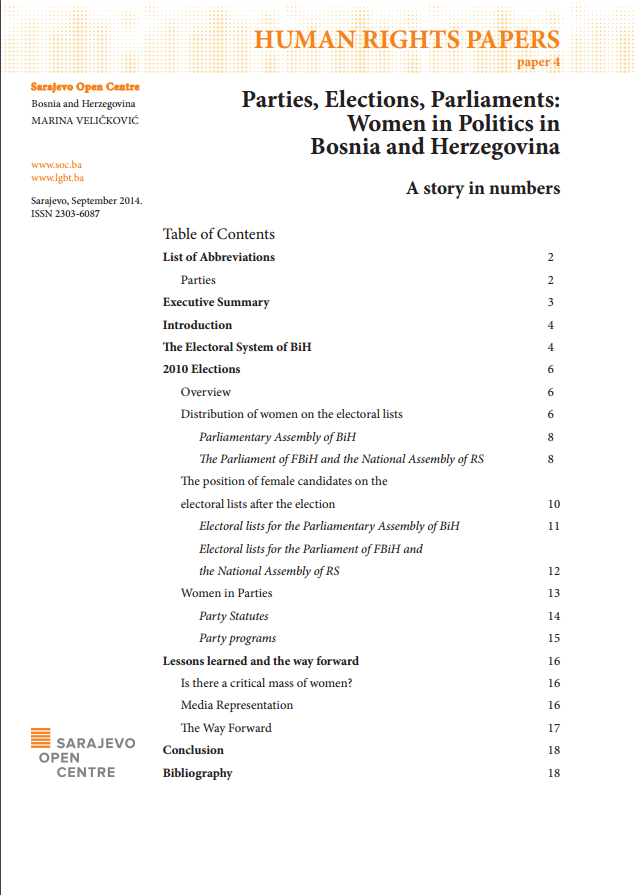PARTIES, ELECTIONS, PARLIAMENTS: WOMEN IN POLITICS IN BOSNIA AND HERZEGOVINA
PARTIES, ELECTIONS, PARLIAMENTS: WOMEN IN POLITICS IN BOSNIA AND HERZEGOVINA
Author(s): Marina VeličkovićSubject(s): Politics, Gender Studies, Governance, Government/Political systems, Electoral systems, Evaluation research
Published by: Sarajevo Open Centre
Keywords: parties; elections; parliament; women in politics; BiH;
Summary/Abstract: This report looks into the participation of women in politics in Bosnia and Herzegovina. It is a gendered study of the 2010 election. Three things were examined: • The position and distribution of women on electoral lists, • The change in the position of women on the electoral lists as a consequence of voting, • The presence of women in the political parties. Following the 2010 election, where women made up 39,39% of candidates on the list, the legal requirement was raised to 40% in 2013 and is now in line with the BiH Gender Equality Law. In order to evaluate the likely impact this will have on the 2014 elections, the study looked into the 2010 election in order to see if any patterns regarding participation of women appear. Eleven parties were included: SDP, SNSD, SDA, SDS, SBB, HDZ BiH, SBiH, HDZ 1990 - HSP, NSRZB, PDP and DNS, based on the gains they made either in the state, or entity parliaments. It has been found that the official figure of 11.95% of women as the top of the list candidates overestimates the participation of women, because the number is far lower among the parties that actually gained seats. Further, only 20.3% of women on the lists for the Parliamentary Assembly of BiH were listed higher than the legal requirement, and the number is even lower for the entity parliaments. It has also been shown that women slide down the electoral lists as a result of voting, with SBB lists being the only exception. Finally, party statutes and programs, as well as executive boards were analyzed in order to asses the representation and participation of women in parties, and it has been found that with a few exceptions (notably SDP) presence of women is a symbolic, rather than a substantive gesture. The following conclusions were derived: • There is no correlation between the percentage of women at the top of the list, the percentage of women that were listed higher on the list than the minimum legal requirement and the percentage of women parliamentary representatives; • The highest percentage of women listed higher on the list than the minimum legal requirement is for the Parliamentary Assembly of BiH (20.03%), then FBiH Parliament (17.2%) and the lowest is National Assembly of RS (12.16%); • Regarding the number of women at the top of the list, the entity lists fare better than the Parliamentary Assembly of BiH lists; • In addition to being lower on the lists to begin with, women further dropped down the list of candidates as a result of elections; • The smallest difference was on the lists for the Parliamentary Assembly of BiH and the highest difference with the biggest drop was on the lists for the National Assembly of RS; • SBB was the only party where women climbed on the list and placed higher as a result of the election; • There is a range, from the parties which have mainstreamed gender in their statutes, to parties that are only selectively opening their doors to women, to, finally, parties that are only including select women in select bodies, therefore limiting the access to higher party echelons to men, and there is a similar range in the content of the party programs - from cursory mentions of women in the context of motherhood, to references to the Gender Equality Law; • SDP has the highest proportion of women in their executive bodies, while SDA has the lowest; • There is a correlation between the attitudes towards gender equality in party statutes and programs, but it is impossible to establish correlation between the percentage of women in leadership positions in the parties and the percentage of women representatives from that party in the parliament. Finally, quotas have contributed to positive change, but have possibly reached their limits. Without a change in the political culture that sees female and male candidates as equal, and more importantly treats them as such, quotas do little more than just up the numbers, without making politics more equitably gendered.
Journal: Human Rights Papers
- Issue Year: 2014
- Issue No: 4
- Page Range: 1-19
- Page Count: 19
- Language: English

